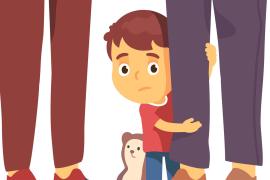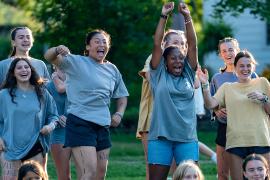In the summer of 2014, I was the association director of inclusion for the South Shore YMCA in Massachusetts, with oversight of the inclusive day camp sites. It was officially our first summer of welcoming and supporting campers with diverse abilities into our traditional day camp settings. After a challenging start, we quickly found ourselves in week five of the summer season. The attitudes and fear around inclusion at camp were beginning to soften.
It was 9:00 a.m. on a Wednesday when I received a text from our inclusion coordinator requesting that I come out to the red tent. Filled with apprehension, I excused myself to attend to the request. Being called out to a specific group this early in the day generally meant that there was some type of issue. On the way there I tried to remember, Who’s in the red group? Our buddy Kyle. A wave of uneasiness washed over me as I assessed possible scenarios I might be walking into.
Kyle was new to our camp but not new to day camp situations. He had been kicked out of three summer camp programs before applying to ours — and we were determined to make it work. He had quickly become the face of disability inclusion and a measurement of the success (or failure) of our program.
To be honest, he had a rocky start. During weeks one and two we were faced with many questions and doubts about our ability to help Kyle be successful in a typical day camp setting. The inclusion team heard more than once, “Maybe he should just go to a special camp. We can’t handle a kid like him.” This, of course, made us work doubly hard, as we were determined to help Kyle (and many other kids like him) be a successful camper, a valued member of the camp community — and, most importantly, to belong.
Weeks three and four we were diligent in utilizing every inclusion strategy we knew of. We worked closely with his camp counselors and family, and by week four things seemed to click for Kyle. But had they?
I braced for the “I told you so” looks and exclamations as I reached the red tent. I saw Kyle’s mom, and I could see that she had been crying. My heart sank.
Kyle’s mom did not speak; she simply handed me a piece of paper. Puzzled, I looked over at my inclusion coordinator, who also said nothing but nodded to indicate I should read it. It took me a moment to realize that I was looking at a birthday party invitation. To Kyle. From a peer he had befriended while at camp. His mother’s tears were tears of joy.
At 11 years old, this was Kyle’s first birthday party invitation — and a by-product of an authentic friendship he had formed at camp. A friend who also loved Lego-Robotics, archery, and their peanut butter and jelly sandwich cut into triangles with the crusts removed. A friend who was neurotypical, did not have disabilities, and who liked Kyle and enjoyed spending time with him. A friend who saw Kyle’s strengths and qualities, who shared his interests, and celebrated his passions. A friend Kyle met because the team at the South Shore YMCA saw the value of creating an inclusive camp environment.
Building a Pathway for Friendships
We live in a world where isolation and loneliness are becoming increasing challenges for all communities, but especially for people with disabilities who, compared to the general population, have less social support and are more socially isolated (Emerson et al., 2021).
It has been said that friendship is an antidote for loneliness, but making friends can also be more difficult for people with disabilities. (Emerson et al., 2021).
Inclusive camp and recreation enable children with diverse abilities to participate in community sports and activities that help them gain activity-specific skills, group participation skills, self-esteem, increased independence, and opportunities to engage in positive peer interactions (Wenner, 2016). This makes camp an ideal setting to begin a connection that could lead to an authentic friendship between a person with and a person without a disability.
The Power of Friendship
Friends are good for our health. They help us celebrate good times, are supportive during bad times, and give us a reciprocal opportunity to offer needed companionship. Friends can also increase our sense of belonging and purpose, boost our happiness, and reduce our stress (Mayo Clinic, 2022).
However, we can hardly get to friendship without first taking the path through inclusion.
Through Kyle’s story, we see the impact of committing to inclusion. We can recognize more clearly the end result, the opportunities — what’s possible. When we focus on the gifts and values an individual can share with their community, we take the first step in facilitating and fostering a friendship based on mutual interest. But this doesn’t just happen. It calls for proactive steps by camp counselors and leaders alike. It requires creating a welcoming and accessible environment for people with disabilities to participate — and intentional actions to foster authentic peer relationships. In doing so, we can create a culture in which developmentally typical campers and campers with disabilities alike can transition from simply participating to a place of actually belonging.
Lisa Drennan is the founder of MERGE Diverse Abilities Inclusion Consulting, providing staff training and expert consultation to recreation, camp, sport, and community organizations on how to be inclusive of people with diverse abilities. She is the primary author of Building Friendships between People with and People without Disabilities, made possible by The Arc Massachusetts. She can be reached at [email protected] or (781) 724-1918.
Photos courtesy of MERGE Diverse Abilities Inclusion Consulting, Pembroke, MA.
References
- Emerson, E., Fortune, N., Llewellyn, G., & Stancliffe, R. (2021, January). Loneliness, social support, social isolation and wellbeing among working age adults with and without disability: Cross-sectional study. Disability and Health Journal. sciencedirect.com/science/article/pii/S1936657420300960?via%3Dihub
- Mayo Clinic. (2022, January 12). Friendships: Enrich your life and improve your health. mayoclinic.org/healthy-lifestyle/adult-health/in-depth/friendships/art-20044860
- Wenner, R. C. (2016, December). Sports and recreation for children with disabilities. St. Cloud State University. repository.stcloudstate.edu/cgi/viewcontent.cgi?article=1010&context=cfs_etds



